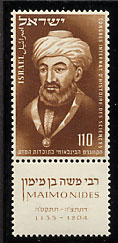|
|
| Emission : 3 août 1953 | N° Y. & T. : n° 66 |
|
|
|
|
7e Congrès International d'Histoire des Sciences, à Jérusalem
HISTORY
OF SCIENCE CONGRESS (RAMBAM)
On
the occasion of the Seventh International Congress of the History of Science
held in Jerusalem, a stamp honoring the rabbi, scholar, physician, scientist,
and philosopher, Maimonides (Moses ben Maimon, known also by his initials
as Rambam).
Born
on March 30, 1135, in Cordova, Spain, to a scholarly father who was a dayyan (religious
judge) and community leader, Maimonides early received a thorough education,
both in Hebrew as well as Arabic literature, philosophy, and science.
In
his early youth he witnessed the rise and conquests of the fanatical Almohades
and the resulting decline and end of the golden era of Arabic-Moorish
culture to which the Jews contributed significantly. Forced at the age
of 13 to flee his native city, he and his family wandered for 10 years
over North Africa and Palestine. Despite suffering during years of fear
and oppression, he devoted himself to his studies and perfected himself
in medicine to an extent that when he at last settled in Egypt, in the
city of Fostat (now Cairo), he could establish himself as a practicing
physician. He gained such renown that, after some years, he was appointed
personal physician to the sultan Saladin the Great and later to his son.
Maimonides
wrote many books and essays in the field of medicine, especially on hygiene
and diet. Translated into Latin and subsequently into other languages,
they are important contributions to the history of science. In addition,
he wrote on astronomy.
In
the sphere of Jewish Studies, his first major work was a commentary on
the Mishnah written in Arabic. It is the first attempt at the scientific
clarification of the language and a rational Aristotelian explanation
in a clear, simple manner as to the meaning and portent of all the traditional
religious laws.
While
Maimonides continued as physician at the Court, his fame and authority
as rabbi and leader was established. About the year 1180 he became head
of the Cairo Jewish community, which meant, in fact, of all Egypt and
Palestine as well as the rest of the Near East.
The
height of his philosophical creative genius comes to light in his Moreh
Nevukhim (The Guide of the Perplexed).
He
died in Egypt on December 13, 1204; his remains were taken to Tiberias
for burial. Maimonides’ grave is a well-visited place of pilgrimage.
Commentaires :
Portrait de Rabbi Moshe Ben Maimon (1135-1204)
Informations techniques :
| Taille : | .. x .. mm | Dessinateur : | Wind Struslki |
| Dentelure : | 14 x 13 | Couleur : | brun foncé |
| Valeur(s) : | 110 p | N° Scott : | 74 |
Billet de banque avec l'effigie de Maïmonide
Copyright ©HA.2000-2020
![]() :
5/08/09
:
5/08/09

